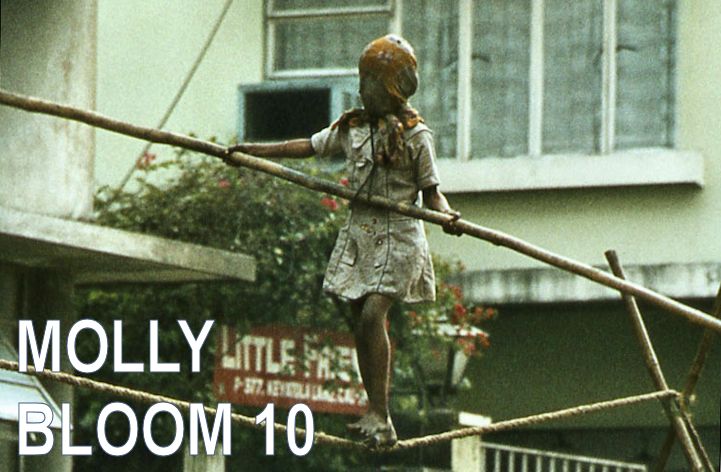 All photos in Molly Bloom, apart from those in issue 4, are copyright Aidan Semmens
All photos in Molly Bloom, apart from those in issue 4, are copyright Aidan Semmens
As she enters her fourth year as a web presence, Molly Bloom offers another strong and powerful collection of poetry, once again with a thematic sense not aimed at. Kat Peddie’s excellent let no man steal your thyme is here because I heard it at a reading in Canterbury and begged permission to publish it, and the ordering of contributions is of course a matter of editorial judgement, with little expectation that visitors will read the work in the order listed, but otherwise the achieved integrity is a matter of serendipity.
A question recently raised elsewhere was about the relative merits of publishing poetry online or in print magazines.
There is some outstanding work published in both media. Any editor of either type will tell you there is also an awful lot of awful writing around. Rather too much of it finds its way into the world in both print and online form. A couple of fat magazines (both, perhaps coincidentally, from North America) have landed on my desk lately demonstrating that print production is no guarantee of quality.
There is too much writing that seems to have no purpose. On the one hand there is a deluge of the banal that would be better laid out as the prose it really is. On the other, the apparent randomness of what one Molly Bloom poet refers to as “word salad”, from which all semblance of meaning has been rigorously scrubbed away – so why read it? Too much of both kinds is written with no evident attention to the cadences of speech or song – in which case, how do you read it?
You will find no instances of these failings here. Molly Bloom has also politely declined many offerings that were not badly written, but failed to make any case for the necessity of their publication. Online publication may be quicker, cheaper and easier than setting up and distributing a print magazine, but that is no reason why it should be used willy-nilly, to waste readers’ time. Since its inception, Molly Bloom has published only work that is both artistically creative and critically, perhaps passionately, engaged with the world: there seems to me little point in publishing anything else.
Among the advantages of the web are its immediacy and its lack of marginal cost. The Festschrift for Tony Frazer which I produced last year would never have made it as a print publication, but was highly successful as a website (as well as huge). I still feel honoured when my work appears in print, in magazines such as the excellent Tears in the Fence, Long Poem Magazine or Shearsman, but I think it probable, bordering on certain, that online publication reaches further.
Molly Bloom flopped as a print publication in the 1980s, despite what I still think was brilliant content, because I had no mechanism for reaching the potential audience; in web form she reaches more readers in even a flat week than the original edition had in total. I have friends all around the world, some of them Molly Bloom poets, whom I would never have encountered in either the virtual or 'real' worlds but for the internet's capacity to create far-flung communities of the like-minded. Those of us who enjoy and work in this field of engaged poetic rigour dwell, after all, in a niche within a niche. It's only through the web that you discover how many of us there are.
And, of course, in print you cannot do things like this or this or this.
Aidan Semmens, editor, May 2016
A question recently raised elsewhere was about the relative merits of publishing poetry online or in print magazines.
There is some outstanding work published in both media. Any editor of either type will tell you there is also an awful lot of awful writing around. Rather too much of it finds its way into the world in both print and online form. A couple of fat magazines (both, perhaps coincidentally, from North America) have landed on my desk lately demonstrating that print production is no guarantee of quality.
There is too much writing that seems to have no purpose. On the one hand there is a deluge of the banal that would be better laid out as the prose it really is. On the other, the apparent randomness of what one Molly Bloom poet refers to as “word salad”, from which all semblance of meaning has been rigorously scrubbed away – so why read it? Too much of both kinds is written with no evident attention to the cadences of speech or song – in which case, how do you read it?
You will find no instances of these failings here. Molly Bloom has also politely declined many offerings that were not badly written, but failed to make any case for the necessity of their publication. Online publication may be quicker, cheaper and easier than setting up and distributing a print magazine, but that is no reason why it should be used willy-nilly, to waste readers’ time. Since its inception, Molly Bloom has published only work that is both artistically creative and critically, perhaps passionately, engaged with the world: there seems to me little point in publishing anything else.
Among the advantages of the web are its immediacy and its lack of marginal cost. The Festschrift for Tony Frazer which I produced last year would never have made it as a print publication, but was highly successful as a website (as well as huge). I still feel honoured when my work appears in print, in magazines such as the excellent Tears in the Fence, Long Poem Magazine or Shearsman, but I think it probable, bordering on certain, that online publication reaches further.
Molly Bloom flopped as a print publication in the 1980s, despite what I still think was brilliant content, because I had no mechanism for reaching the potential audience; in web form she reaches more readers in even a flat week than the original edition had in total. I have friends all around the world, some of them Molly Bloom poets, whom I would never have encountered in either the virtual or 'real' worlds but for the internet's capacity to create far-flung communities of the like-minded. Those of us who enjoy and work in this field of engaged poetic rigour dwell, after all, in a niche within a niche. It's only through the web that you discover how many of us there are.
And, of course, in print you cannot do things like this or this or this.
- For further, deeper, thoughts on poetry and publishing, I commend this engaged and engaging review by one of Molly Bloom’s favourite poets, Peter Riley, of the recent work of another, Vahni Capildeo.
Aidan Semmens, editor, May 2016

